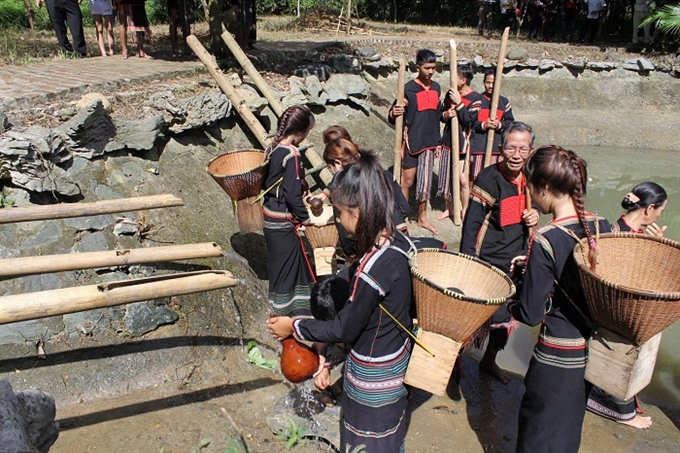 Life & Style
Life & Style

Rituals and cultural practices of ethnic groups in the Central Highlands provinces will be depicted during activities held at the Việt Nam National Village for Ethnic Culture and Tourism, Sơn Tây Town, Hà Nội.
 |
| During the festival paying gratitude to the water god, the ethnic people clean the water source and present offerings to the god. — Photo courtesy of the Việt Nam National Village for Ethnic Culture and Tourism |
HÀ NỘI — Rituals and cultural practices of ethnic groups in the Central Highlands provinces will be depicted during activities held at the Việt Nam National Village for Ethnic Culture and Tourism, in Sơn Tây Town, Hà Nội.
A wide range of events will take place until the end of May with theme of ’Uncle Hồ with the Central Highlands’.
The event doesn’t just highlight the uniqueness of the diversified culture of the region, but it also reflects the strong bond between President Hồ Chí Minh and those in the Central Highlands.
It is the framework of activities to celebrate President Hồ’s birthday on May 19.
Eighty ethnic people from 11 groups live in the village, and 40 from people from the Gia Rai, Raglai, Chăm and Ê Đê groups from the Central Highlands region will participate at the festival.
An exhibition of photos, newspaper stories and documents depicting the close relationship between Uncle Hồ and indigenous communities in the Central Highlands will run between May 12-31.
Another exhibition, Lotus in Vietnamese Cultural Life, will take place on May 19-20. It introduces photos of lotus flowers - the national symbol of Viet Nam, and cuisine made from the lotus such as tea, porridge and mứt sen (sugar-coated lotus seeds).
Various traditional festivals of ethnic minorities such as the rice worshiping ritual of the Ê Đê people in Đắk Lắk Province, wedding ceremonies of the Raglai from Ninh Thuận Province, and the prayer for the water god of the Gia Rai people in Gia Lai Province will be reinacted in the village.
For the ethnic people, the water god (Yang Ia) is very important. During the festival they will be paying gratitude to Yang Ia, and will clean local water sources and present offerings to the god.
They believe the ritual will help them to have prosperous water resources and a healthy life.
In addition, performances of music, singing and dancing will take place at weekends during this month.
Tourists will have a chance to experience cooking traditional foods of the Central Highlands ethnic groups. — VNS




